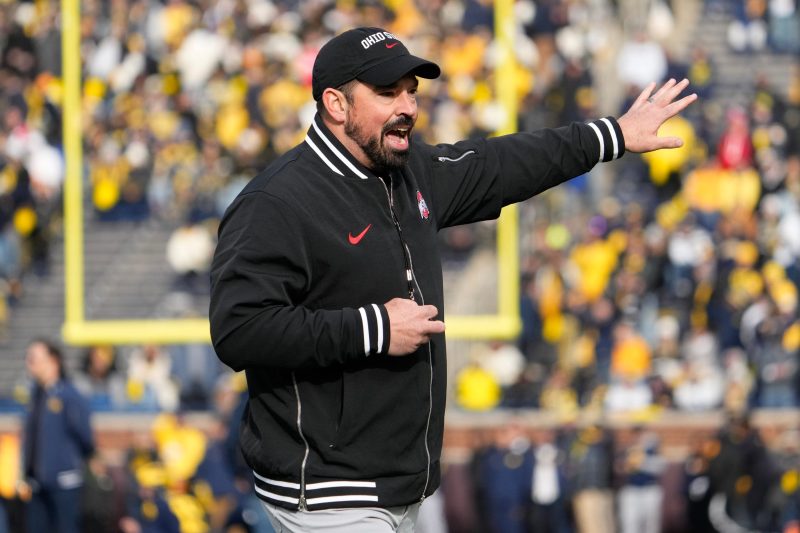After his third consecutive loss to Michigan — an almost unforgivable sin for any Ohio State coach — Ryan Day has only two choices in front of him, either of which will define the rest of his career.
He must either commit to completely junking the ultra-conservative approach that cost him yet again in the only game that really matters or admit to himself he’s not the right guy for Ohio State and sprint to Texas A&M.
Unlike the the last two years, Saturday was not some huge indictment of Day’s playcalling or Ohio State’s toughness. It wasn’t a blowout or an embarrassment. Quite simply, Michigan won 30-24 because its quarterback played a little bit better than Ohio State’s.
That’s the difference between winning the Big Ten and staying home next week. That’s what separates a College Football Playoff berth from a disappointing postseason. For all the accusations around this rivalry, the difference between the two teams turned out to be pure and simple.
But this three-year stretch of Michigan dominance — its first since 1995-97 — is now baked into the cake for any conversation about Day going forward. If he manages to steer the rivalry back toward Ohio State, it’s the ‘yeah, but” that will always linger in the background. If he doesn’t, his near-pristine record against everyone else in college football won’t be enough to save his job at some point.
That’s where Texas A&M comes in.
Keeping in mind that it’s agent season, and agents often have reason to exaggerate interest in their clients or just make things up out of whole cloth, it was a bit of an eyebrow-raiser Saturday when Bruce Feldman of Fox and The Athletic said the Aggies could make a run at Day to replace Jimbo Fisher.
It makes some sense. Texas A&M likes to make splashy hires and has pretty much an endless supply of financial resources, but there’s no obvious slam-dunk candidate out there with a track record of winning at the highest level.
Normally, the idea that Texas A&M could poach Ohio State’s coach would be laughable. But these aren’t normal circumstances, and the opportunity to hire an established winner who is 56-7 as a head coach is absolutely worth a try.
Had Ohio State won Saturday, this possibility would have quickly faded away. Ohio State is a better job than Texas A&M with pretty much equal resources, and Day has proven that he can come very, very close to winning a national title there.
But at Ohio State, winning The Game is everything. And it’s possible Day just isn’t built for a job where there’s a 365-day-per-year focus on one opponent.
Because if you watch Day coach against everyone else, then watch him coach against Michigan, it’s clearly in his head. He gets tight. He goes into a shell. He makes decisions that suggest he’s a little too scared of choosing incorrectly.
And what makes it worse is that his counterpart Saturday, Michigan’s offensive coordinator and interim coach Sherrone Moore, didn’t have that problem.
Put in the unenviable position of replacing the suspended Jim Harbaugh, Moore pretty much pitched a perfect game. He looked completely in control on the sidelines. He took calculated risks without being over-aggressive. He went for fourth downs when it made sense — and was rewarded by converting 3-of-3. Michigan did not look like a better team than Ohio State, but it was just better enough on the margins to win.
Meanwhile, when Day was presented with some opportunities to play aggressive football, he did not take them. On the Buckeyes’ second offensive series, they faced a fourth-and-1 at their own 46-yard line.
Admittedly, this is a borderline call for any coach. But given that Day emerged from the Michigan game the last two years under heavy criticism for keeping such a tight rein on one of the most talented offenses of the decade, it looked like a moment to send a message about the Buckeyes’ intentions, keep the ball and get an early score on the board. Instead, Day punted — not necessarily a bad call, but certainly a scared one.
Day’s more egregious sin, however, occurred at the end of the half after the Buckeyes had driven from their own 2-yard line to the Michigan 34 with less than a minute remaining. Down 14-10 and facing a fourth-and-2, the correct risk/reward play would have been to try and get a quick first down and leave enough time to perhaps get in the end zone and steal the lead going into halftime.
Instead, Day was so scared of not making the first down and giving Michigan a few extra plays that he ran the clock all the way down and sent out Jayden Fielding for a 52-yard field goal. Keep in mind that Fielding, in his first year as a starter, had never even attempted a 50-yarder before with the Buckeyes. It was a low-percentage decision disguised as the safe option, and Day got what he bargained for when Fielding missed.
Are those two decisions to blame for Ohio State’s loss? No, not directly.
In the end, it boiled down to Michigan quarterback J.J. McCarthy playing a clean game for the Wolverines when they needed it most and Kyle McCord finding the stage a bit too big. He threw a truly awful first-quarter interception that pretty much handed Michigan seven points, and then he threw another on the final series when Ohio State was driving for a potential victory.
If you want to blame Day for failing to recruit or develop a better quarterback, fine. But McCarthy’s years of starting experience and McCord’s inability to get meaningful reps until this season because he was blocked by C.J. Stroud showed up in this game. That’s football.
But in the macro, Day has a real problem in this matchup. Michigan plays and coaches with confidence and freedom. Ohio State plays and coaches with inhibitions that suggests they feel the pressure far more.
Day must change that dynamic. There’s no other option for him — except now, perhaps, to junk it all for College Station, a big pile of money and a different set of expectations.
After another crushing disappointment at the hands of Michigan, a fresh start might be a pretty appealing outcome for all parties.






